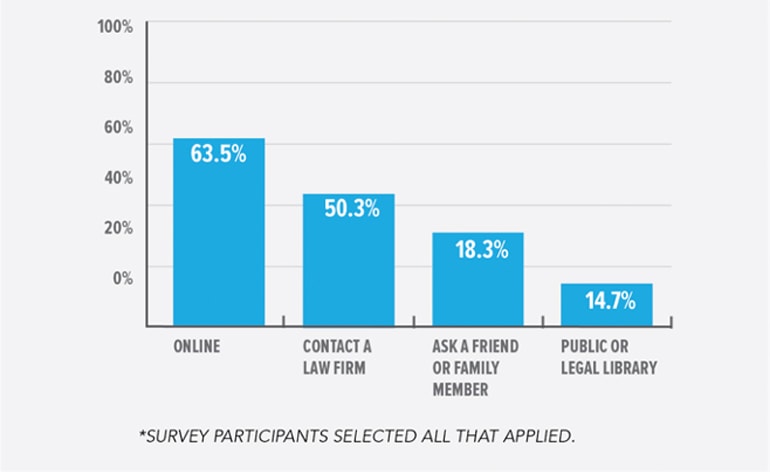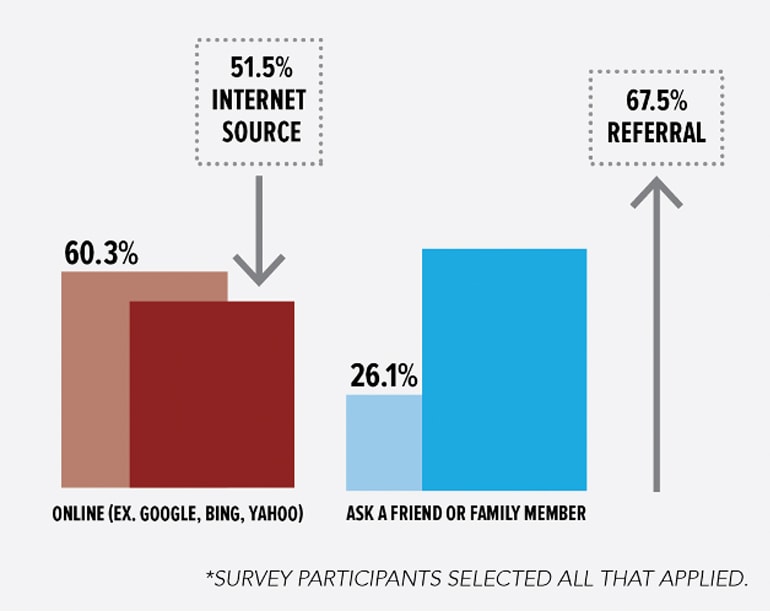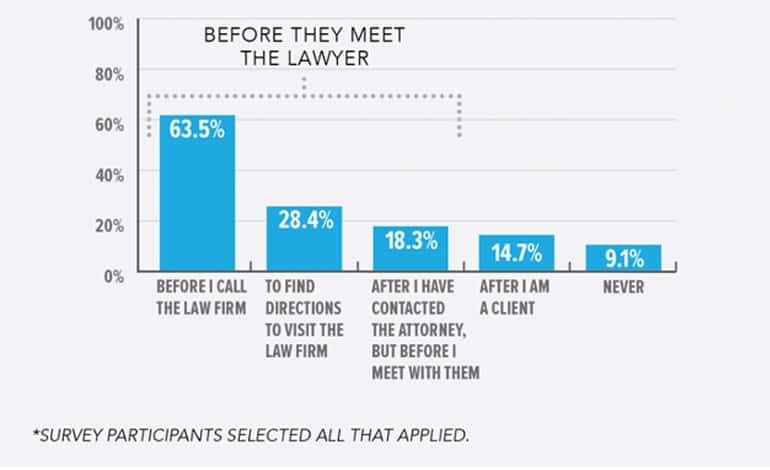So far in this series on internet marketing for law firms, we’ve talked about defining your marketing strategy, building your firm’s brand by design, improving your intake/sales process, and why online marketing is more than just your website. Now it’s time to get into the details of how to boost your online presence and protect your referrals.
First, here’s a quick refresher on what I mean when I say “protect your referrals.”
What Does It Mean to ‘Protect Your Referrals’?
Many law firms still get a lot of business from their referral networks, or word-of-mouth, or because of the strong “brand” recognition of their firm name. When law firms come to us, they are usually concerned that their referrals are slowing down, so they want to invest in online marketing to get business directly from the internet. After a few months, many of these firms’ referral business is back, often better than before. While I think our agency is pretty good at what we do, we aren’t using some magical formula. We simply start by focusing on the fact that referrals are using online searches to check out a lawyer before they call. So, we make sure that when someone Googles our client’s firm name or the names of the lawyers, the search results support the initial referral and convince the prospect to contact them.
Understanding How Prospects are Searching for Lawyers Online
I don’t think it’s a surprise to anyone these days that referrals are moving online. But a few years ago, we conducted a survey that led to our protection strategy. We first asked people, “If you were faced with a legal issue, where would you search?” Most said they would look online to research these issues; only 18.3% said they would ask a friend or family member. We know that many people use the internet to answer questions they have about different issues, especially ones they are not ready to discuss with a friend.
Figure 1: If you were faced with a legal issue, where would you search?
We changed the question from researching a legal issue to something more specific that impacted them or a loved one. We asked, “If someone you know needed an attorney, how would you find one?”
The same group of people indicated they would ask a friend or family member. Interestingly enough, the 2019 Clio Legal Trends report had a similar finding, showing about a 50/50 split between someone solving their legal issue using a referral versus searching on their own.
Figure 2: If someone you know needed an attorney, how would you find one?
The most important data we received, though, was in the answers to the question, “When are you likely to visit a law firm’s website?” The “aha” moment was when we realized the data told us that referrals are alive and still very strong, but the referral was checking out the law firm online first before they called.
Figure 3: When are you likely to visit a law firm’s website?
It checks out. Let’s say I am having marital issues and I have a friend who recently went through a divorce, so I ask them for a recommendation for a lawyer. My next step would likely be to grab my phone — but not to call that law firm. Nope, I would open the browser and search the lawyer’s name.
This Is Where You Start Losing Referrals You Didn’t Even Know You Had
What happens next if I don’t see any reviews or other supporting material like a directory or social media account when I search for that lawyer? It takes only one quick search for “divorce lawyer near me” to see which other lawyers in my area show up high in Google’s rankings.
Various other things could influence why I don’t call the lawyer my friend recommended. Maybe their online reviews are lukewarm. Or maybe when I Google the lawyer’s name, the first few results are for a different person with a similar name. Or, when I finally find the firm’s website, it looks 10 years old, making me doubt the lawyer is still in business — or, how up to date they will be on my legal issues.
You probably wouldn’t believe the number of times we do a quick audit for a law firm and see listings with old tracking numbers the firm didn’t even know about. When we call these old numbers, they end up ringing an entirely different business. (If you bought Yellow Pages ads years ago, you were likely given a tracking number by the service. Once you stopped paying for the ads, those numbers were recycled to someone else.)
Any of these things is enough to cause a referral to return to the Google search bar and switch from your firm’s name to “[insert practice area here] attorney.”
Not doing the basic work to ensure you have a strong internet presence when someone searches your name means you are likely losing referrals that you didn’t even know you had.
Branded vs. Non-Branded SEO
What I am about to suggest is tedious and takes time. If you are not ranking on your “[insert practice area] near me” (e.g., “DUI lawyer near me”), this will not propel you to the top of those searches suddenly. We call that strategy non-branded search engine optimization (SEO). Non-branded searches are people searching for answers to their issues that don’t know your firm. While worthwhile, that strategy can take up to 12 months of effort, depending on the competition in your area. (We’ll cover this in later articles.)
Start With Branded SEO
The “Protect Your Referrals” strategy requires branded SEO. Branded search keywords are just like they sound. They are the brand names people search on. Think people searching on branded keywords like “Papa Johns” or “Domino’s.” The non-branded equivalent would be someone searching “fast pizza delivery near me.” For a law firm, the brand search keywords are, of course, your law firm name, but the public-facing lawyers and staff in your firm are part of the brand too.
Because this will take you a little time, let me give you an example of what you can look forward to in the results. Note that results will vary based on your referral network and years in practice in your local area.
A “Protect Your Referrals” Case Study
A client came to us having only about 139 sessions per week on their website across a four-month period. They tracked their data using intake forms and a spreadsheet, which indicated they received about seven leads per month during that time. They had a good track record in their local area and had done a lot of offline advertising. However, an initial audit of their web presence showed that when you searched for their name, the perception was that they were not in business or not very good.
We spent the next couple of months claiming and optimizing their directory listings, including for Google My Business. We launched a mobile-friendly website with unique pages optimized to their firm name and lawyer names. We worked with them to reach out to clients to get positive online reviews.
After just four months, the traffic increased to an average of 210 sessions per week, a respectable 51% increase, but they received an average of 19 leads per month — a 171% increase.
They are in a competitive area, and after only four months, their rankings on the non-branded keywords like “car accident near me” hadn’t moved to the first page of Google, as this was the hard SEO work that we knew would take nine to 12 months.
Why did the percent of leads increase significantly more than the traffic?
The search traffic we could measure showed an increase in the branded search terms coming to their website. Our theory is that the increased traffic was likely referrals who were Googling the firm, finally liked what they saw in the search results, and clicked onto the website. Then, because the visitors liked the website, and it had the right conversion elements in place, they reached out to the firm.
Four Steps: The “Protect Your Referrals” Strategy
Whether you have a strong referral base right now or are working on it, you need a “Protect Your Referrals” strategy so you don’t lose the best prospective clients you can get. Here are the four steps you need to take:
- Claim and optimize your directory listings.
- Build a “review culture” to get positive reviews online.
- Use social media to enhance and protect your brand.
- Create a mobile and branded search-optimized website.
In the next installment, we’ll focus on step one and get into the details of how to claim and optimize your directory listings, including how to set up your Google My Business page.
Illustration ©iStockPhoto.com
Catch Up on Mark Homer’s Digital Marketing Series
So far in this series on internet marketing for law firms, we’ve tackled defining your marketing strategy, building your firm’s brand by design, improving your intake/sales process, why online marketing is more than just your website, and, above, what it means to protect your referrals:
Subscribe to Attorney at Work
Get really good ideas every day for your law practice: Subscribe to the Daily Dispatch (it’s free). Follow us on Twitter @attnyatwork.




















